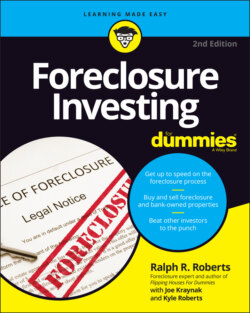Читать книгу Foreclosure Investing For Dummies - Ralph R. Roberts - Страница 49
Getting one last chance during the redemption period
ОглавлениеReasonable people would assume that when they buy a property at a foreclosure sale, it’s automatically their property, but that’s not always the case. Many areas of the country have a mandatory redemption period, which can last from a few months to an entire year. Check out the appendix at the back of this book to find out about the redemption period in your area.
During the redemption period, the person who purchased the property at the sale is responsible for insuring the property and paying the property taxes, but the foreclosed-upon homeowners have the right to redeem the property. To do so, the homeowners must come up with enough cash to pay off the mortgage in full, along with any interest and penalties and, in some cases, the investor’s expenses.
Depending on the rules that govern redemption in your area, the buyer may or may not have the right to recover expenses (including property taxes and insurance) from the homeowners. Consult your real estate attorney to find out exactly what you’re allowed to recover if the homeowners redeem the property.
If you purchase a property at a foreclosure sale in an area that has a mandatory redemption period, you end up with the property about 50 percent of the time. The only sure way to end up with the property is to buy in markets that don’t have redemption periods. (Check out the appendix at the back of the book to determine whether your state has a mandatory redemption period.) To protect your investment in areas that have a redemption period, take the following precautions:
If possible, repair any defects in the house that may be considered to be unsafe or lead to further deterioration of the property. If the property is vacant and unsafe, and you don’t take care of the problem immediately, the property is likely to lose value. Avoid investing any more money in repairs than is absolutely necessary; if someone redeems the property, you stand to lose that money.
Insure the house and file an affidavit of payment so that if the homeowners redeem the property, you have a better chance of recouping your expenses. Consult your real estate attorney to determine your rights to recover expenses.
Pay the property taxes, and file an affidavit proving payment.
Don’t invest in any renovations. If the homeowners redeem the property, you could lose all the money you invested in the renovations. Generally, you perform repairs only to protect your investment if the house is vacant or if you’ve worked out an arrangement with the occupants to ensure that you won’t lose any money you invest in the property. Different states may have different abandonment laws that may restrict you from doing anything. Your real estate attorney can provide guidance here.
Keep an eye on the property to protect it from vandalism and theft. Some disgruntled homeowners may strip the property before vacating it.
For additional advice on surviving the redemption period, see Chapter 16.
All sales aren’t final in areas with redemption periods. If you miss out on an opportunity during the foreclosure sale, you haven’t necessarily lost the property for good. The homeowners still control the property, and you can work with them to bump the investor who purchased the property out of the deal. The knife cuts both ways, of course: You could end up getting bumped. You get your money back, but you lose out on the property.
